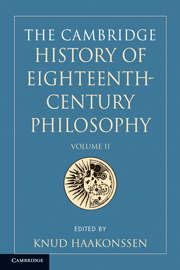36 - Philosophical Reflection on History
from V - Moral Philosophy
Published online by Cambridge University Press: 28 March 2008
Summary
The expression ‘philosophy of history’ was coined by Voltaire, but in the eighteenth century it referred to a specific project that by no means exhausted the scope of philosophical interest in history during the period. We will do better to speak of a philosophical reflection on history, both because it is terminologically more appropriate and because this broader term will remind us that a philosophical interest in history affected almost all spheres of philosophy in the period. Philosophical stances on providential history, the stages of history, and the status of historical knowledge played a crucial but often overlooked role in the debates on the foundation of morals and politics, in efforts to produce a science of human nature, and in central epistemological discussions.
The rise of modern science, the impact of Cartesianism and scepticism, and the progress made by concrete historical research in the seventeenth century all helped to undermine any model of knowledge in which providential history could remain the frame of reference for all moral and empirical sciences. In fact the foundation of the different areas of knowledge was an open question, as was their place in the emerging ‘science of man’, or ‘science of human nature’. In that context, a common problem was how to provide a single account of both the factual and the normative sides of history. The challenge was to produce an account of history that revealed the origins of social life without counterfactual speculations. This was not easy, for the development of historical research (essentially the work of antiquarians and philologists) constantly threatened universal histories that wanted to preserve the normative function of history as a ‘teacher of life’.
- Type
- Chapter
- Information
- The Cambridge History of Eighteenth-Century Philosophy , pp. 1107 - 1140Publisher: Cambridge University PressPrint publication year: 2000
- 5
- Cited by

